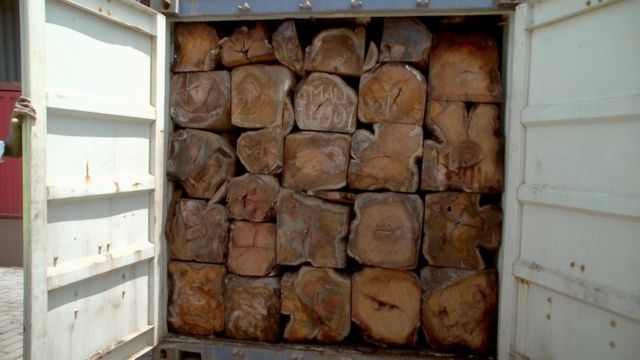13 containers of rosewood seized at Tema Port
In July, 2019, the EIA published a groundbreaking report titled, ‘BAN-BOOZLED: How Corruption and Collusion Fuel Illegal Rosewood Trade in Ghana’.

Thirteen containers of Rosewood, estimated at $234,000 or over GH1.4 million, that were imported into Ghana from Nigeria for re-export to overseas destinations have been impounded at the Tema Harbour.
The 20-cubic-metre containers of Rosewood were smuggled into the Tema Port on August 24, despite the outright ban on the harvesting, transporting, importing and exporting of the endangered tree species in the country.
A high-level collaboration and intelligence gathering between the Ministry of Lands and Natural Resources (MLNR) and other mandated state agencies led to the impounding of the containers at the Overseas Commerce Ghana Limited Terminal at the Tema Port.
The Deputy Minister of Lands and Natural in charge of Forestry, Mr Benito Owusu-Bio, who made this known at a press briefing last Friday, said documentation on the banned products had revealed that a local firm, FELISCO-SUN Company Limited, was behind the trade.
Account
Giving account of how the 13 containers of Rosewood were impounded, the deputy minister said the Lands Ministry, acting on intelligence from the other state agencies, got wind of the arrival of some consignment of the endangered species at the Tema Port and deployed a team to ascertain the veracity of the report on August 24.
The team was made up of members from the National Investigations Bureau (NIB), the National Security, the Forestry Commission and the Customs Division of the Ghana Revenue Authority.
He said on arrival at the port, the team, which he led, spotted the containers but could not open them because their owners were not there, as due procedure required.
The deputy minister said in the afternoon of Friday, August 27, he led another team to the Tema Port, that time comprising the full complement of officials and the consignee, for the containers to be opened.
“We inspected the documents of five of the suspected containers and found the following: the five containers were confirmed to be rosewood, additional intelligence at the port showed that there were actually 13 containers involved, not the five we had initially reported, for which reason we randomly opened a sixth container and that also contained round logs of Rosewood,” he said.
He added that the documentation provided showed that the Rosewood had been imported from Nigeria, with Felisco Company Limited as the consignee.
Prosecution
Mr Owusu-Bio said processes had already begun for the NIB to conduct a full-blown investigation into the activities of FELISCO-SUN Company Limited for appropriate action to be taken against the company.
“We want the NIB to conduct a thorough investigation into this issue because we believe that FELISCO-SUN Company Limited is behind the trade in Rosewood.
“The five containers that were recently impounded at the Tema Port were also linked to the same person. The Rosewood was sourced locally; but this time, they are importing from Nigeria.
“We have the identity and all information on the face behind this illegality, and we are working with that information to ensure that he is prosecuted,” he stressed.
Breakthrough
Mr Owusu-Bio indicated that the continuous export of Rosewood from Ghana had tainted the image of the country in the international community, especially so when Ghana had signed on to the Convention on International Trade in Endangered Species (CITES).
He described the impounding of Rosewood from a different country in Ghana as a breakthrough for the government, saying that it had confirmed suspicion that some unscrupulous people were using Ghana as a transit country for the export of banned tree species.
“We do not have the volumes of Rosewood that are always reported in the international community as wood coming from Ghana. We have always suspected that some people bring the wood from somewhere to Ghana, package it and send it to Asian countries. Now we have evidence to confirm our suspicions,” he said.
Ban still in place
The deputy minister reiterated the fact that the government had no intention to lift the ban on the illegal harvesting, transporting, importing and exporting of Rosewood and would tighten the surveillance regime to track any person flouting that ban.
“Individuals who, with the aid of some shipping agents, import and re-export Rosewood from Ghana must stop with immediate effect because our security checks have been strengthened to deal with such criminal acts,” he stressed.
Mr Owusu-Bio assured members of the public that the Lands and Natural Resources Ministry remained committed to curbing the illegal trade in Rosewood and would continue to change strategies to clamp down on illegal trade in the product to protect the country’s image.
Background
The government placed a ban on the harvesting, transportation, processing and exportation of Rosewood in March 2019 and extended the ban in February 2020.
The extension of the ban was in accordance with the recommendations made by a committee set up to investigate allegations made by the Environmental Intelligence Agency (EIA) that government officials were involved in institutionalised corruption in the illegal trade in the endangered tree species.
In July, 2019, the EIA published a groundbreaking report titled, ‘BAN-BOOZLED: How Corruption and Collusion Fuel Illegal Rosewood Trade in Ghana’.
In the report, the EIA estimated that since 2012, over 540,000 tonnes of Rosewood – the equivalent of 23,478 twenty-foot containers or approximately six million trees, were illegally harvested and imported into China from Ghana, while the ban on harvesting and trading had been in place.
The EIA also alleged that six million logs of Rosewood had been lost to the illegal trade.
The government, therefore, set up a seven-member committee to investigate allegations made against the public officials and make recommendations to halt the illegal trade in the endangered tree species.


